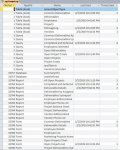We have a number of databases that contain many, many queries and I'd like to delete those that nobody has used for a while.
I've eliminated from consideration all those that are a source for some other object but I'm still left with a lot.
I can identify various properties of Access objects using VBA. What I'm wondering is whether the last time an object was actually opened (not Date Created and not Date Modified) is stored anywhere within the database?
I've eliminated from consideration all those that are a source for some other object but I'm still left with a lot.
I can identify various properties of Access objects using VBA. What I'm wondering is whether the last time an object was actually opened (not Date Created and not Date Modified) is stored anywhere within the database?



